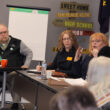It?s no secret we opposed Ballot Measure 30 or at least the huge tax increases proposed by the legislature after its failure to properly deal with the state?s budget.
It wasn?t something we did with great zeal.
It wasn?t because we hate schools or kids or want to see either suffer. Anyone who knows us also knows that just isn?t true.
You didn?t see us or any others out dancing in the streets when the measure was trounced last week by not only rural Oregonians but virtually every other county in the state (except Benton).
Several months ago, when we first editorialized about the poor job the legislature had done–five failed special sessions and the only solution was a massive tax hike–one letter writer suggested we didn?t understand budgeting and accounting procedures.
We do and we think the 60-70% of the other voters who turned down Measure 30 do as well. They have had to face severe budgeting cuts and make business decisions they didn?t want to face, because our elected leaders for the last 15 years have failed to address the state?s number one issue–jobs–and creating an environment in this state that is business friendly.
Don?t dig out shotguns and say that means we support gutting the state?s environemental laws or pillaging the forests.
That?s not what we?re saying, although both areas need to be implemented with much more common sense than is currently being used to interpret their original intent.
There are some folks, who instead of campaigning for Measure 30, should have stood up and admitted their lack of leadership helped drive this state to this point. They include former governors Barbara Roberts, Neal Goldschmnidt and John Kitzhaber, who all failed to protect the state?s number one industry, logging and timber producers. They all treated loggers like second class citizens.
Vera Katz can take a bow as well, thanks to her years in the legislature and education reform that has cost Oregonians millions and millions of dollars because it was rushed through without proper research.
Remember Gov. Roberts saying ?Loggers should play the cards dealt them…? Well, those cards were actually held by the entire state and the hand was a bust.
You can?t cripple the very lifeblood of a state, logging in this instance, and expect good economic health.
It would be like telling farmers in the Midwest they could no longer grow corn, or fishermen in New England to pull up their nets or Taro Card readers in California to fold their hand, for gosh sakes.
Each state has its unique economic lifeblood. Oregon is blessed with mountains, rain, snow and rich soils to produce some of the best Douglas fir in the world. We should celebrate that fact, not be ashamed of it. Importing framing lumber in this state is a pathetic admission of failed policies.
Associated Oregon Industries is calling for a renewed support of the logging industry that once was dominant in this state.
While it may never return to its glory years, we believe with advanced scientific information, improved genetic seedlings and greatly enhanced logging procedures that reads much more easily upon the land, this state could see a marked improvement in its rural economic engine, logging, that will help feed the rest of the state?s thirst for new taxes.
When we moved to Oregon 19 years ago, our school system was flush with funding from the Western Oregon Severence Tax. We had money for raises for teachers and administrators, our athletic programs were strong, our schools were well maintained and our kids weren?t out scrapping for funds every day.
That?s because people were living, working and paying taxes in their own communities.
They weren?t driving to Eugene, Salem, Albany or Corvallis, and shifting the demographic makeup of rural towns.
City folks thought the timber crisis was only a rural issue, but today, 15 years later, they now realize that we?re all in this together and that what impacts rural Oregonians will eventually impact them as well.
Perhaps Oregon?s elected officials have now gotten that message loud and clear.





